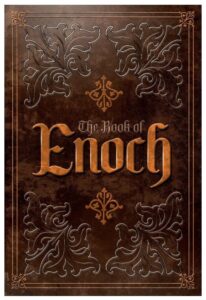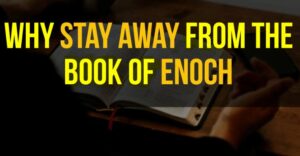We received a lot of questions on the Book of Enoch. So these are some of the questions we got.
- Should Christians read the book of Enoch?
- Or is the Book of Enoch one of the missing books of the Bible?
- Or can we trust the Book of Enoch?
The first thing to understand is that:
What is the Book of Enoch?

“The Book of Enoch is an ancient Jewish religious work, attributed to Enoch, the great-grandfather of Noah. It is not part of the canonical scriptures for most Jewish and Christian traditions, though it is considered scripture by some Christian groups like the Ethiopian Orthodox Church.
The book is primarily apocalyptic and contains visions and revelations about the cosmos, angels, the judgment of the wicked, and the coming of the Messiah. It introduces concepts such as the Watchers, a group of angels who descended to Earth, mated with humans, and brought forbidden knowledge, which ultimately led to divine judgment.
The Book of Enoch exists in several parts, the most notable being 1 Enoch, which survives in its entirety in Ge’ez, the ancient Ethiopian language. It significantly influenced early Jewish and Christian thought, and fragments of it were found among the Dead Sea Scrolls, indicating its importance in Second Temple Judaism.”
Why Stay Away From The Book of Enoch
Now, the Book of Enoch sure is interesting, right?
It’s very old. It is interesting when you read through it because some of the things in it are true. You’ll read things like the fallen angels, and the Nephilim, which are mixed breeds of humans and fallen angels, and it also talks about the end times.
A big part of it focuses on the Genesis. And it’s also interesting that they found the Book of Enoch among other books of the Bible. When they found the Dead Sea Scrolls. So it makes sense that a lot of people are starting to ask questions about this book.
So in this article, I’m going to answer some of these questions, and let me start here with the Bible.
[2 Timothy 3:16]
Now, what is the Bible and how has it been put together? So scripture – the Bible as we know
it today – that we know is put together by the books of the Old Testament, the prophets, then Jesus, the eyewitness accounts of Jesus, Matthew, Mark, Luke, and John, and then also what the other apostles after Jesus wrote down for us through the Holy Spirit.
I’ll talk about this a little bit later on. Some people say that the Bible was put together hundreds of years after Jesus ascended to the Father. That’s not true. They say that Christianity was created just to control people. But that is not true.
We know for a fact that the Bible was put together because of the Old Testament prophets, Jesus, and what the disciples after He taught, who became the apostles. Also, read about Good Morning Prayer for Her.
I mean the first canon was the Muratorian canon, which was compiled in 170 AD. And it had all the New Testament books as well, except Hebrews, James, 1 and 2 Peter, and 3 John. Remember, in the time of the apostles, they were there writing and sending letters to each other.
The church said they knew what letters could be trusted and what could not be trusted. And then in 363 AD, the Council of Laodicea stated that only the Old Testament, along with one book of the Apocrypha, and 26 books of the New Testament – everything but Revelation – was canonical and to be read in the churches.
The Council of Hippo then later, AD 393, and the Council of Carthage, AD 397, also affirmed the same 27 books of the New Testament as authoritative. They knew exactly what can be trusted and what cannot be trusted.
That which can be trusted is called the canon. And God chose the Old Testament prophets and also
the apostles after Jesus, to write down His Word. Not through their perceptions or ideas, but through the Spirit. So God wrote the Bible – breathed out by God.
That’s amazing that they wrote it as they were carried along by the Holy Spirit. It’s amazing. The God of the universe wanted to tell us and give us the truth. And we have it today. [ 2 Peter 1: 21]
Now, just because something is old, it doesn’t mean that you should just trust it. So could there have been other people in that time or a little bit afterward who also wrote books about the Old Testament? Things that happened to Jesus and also the Apostles?
Of course. But that does not mean that it should be included in the Bible, because it was not
written through the Spirit, but by mere men. In fact, there were actually people in that time that the apostles warned against. For example, Peter said: [2 Peter 3:15-16]
So, there were people at that time, who were not part of the group of the Apostles and the disciples who started to share the gospel, who lived and practiced the new way. That’s what they called it. They didn’t call themselves Christians at that time, but people of the way.
So other people started to write about these things, for example, some were called agnostics and some of them pretended to write on behalf of the apostles or even the Old Testament prophets.
That’s the case with the Book of Enoch as well. These books are called the Apocrypha. We call these books pseudepigrapha which means a piece of ancient literature that makes false claims as the authorship.
Pseudepigrapha will purport to have a, well, usually famous or well-known like the apostles author, but its claims are unfounded. So, for example, the writer of the Book of Enoch is not Enoch. We know that. Scholars know that. It’s written by someone else who probably used the name to try and make his book a little bit more famous, to get people to read it.
Enoch lived before the flood. That’s a long time ago. We have no literature of that time. The flood probably washed it all away and just in case some of you do not know who he is, Enoch is the grandfather of Noah.
And God just took him. He never died, he never experienced death, because God just took him. He was one of only two people – the other one was…..do you know? Elijah.
[Genesis 5:24]
And then we see this again in the New Testament.
[Hebrews 11:5]
Now, before he was taken he was commended as having pleased God. So Enoch was a man of God but he did not write the Book of Enoch. In fact, there’s not just one Book of Enoch, but more.
Some people just think there’s just one. There is one Enoch, then 2 Enoch, also known as the book of The Secret of Enoch. And lastly, another book which is about the Hebrew Book of Enoch.
Now, some people say that the Book of Enoch should be included in the Bible because Jude quotes it.
Is that true? Well, it seems like it. [Jude 1:14-15]
Now, because Jude quotes this, we know that this is true. That this is what he said. Enoch.
Many of the disciples and Jesus Himself often quoted from the Old Testament. But here we have Jude who does not quote from the Old Testament that we have, but from the Book of Enoch.
But just because this part that he quoted is true, it doesn’t mean that the whole Book of Enoch is true,
that it should be part of God’s Word, breathed out by God himself.
There might be many things and there are many things in the Book of Enoch that are true, but some are not. And definitely not inspired by God. I can say something right now that is truthful, but it doesn’t mean that God spoke it through me.
Paul actually also quoted from a non-biblical source. He didn’t quote from the Old Testament, he quoted Epimenides. I’m not sure how you pronounce that, but that’s the best that I can do.
Epimenides. We read in Titus 1:12.
So, even though Paul quoted Epimenides – that’s probably more how you pronounce it – it doesn’t
mean that we should now suddenly believe everything that Epimenides said and put it in
the Bible and say that this is from God Himself, that God breathed out and we should trust it. And live it. No.
We trust the prophets God chose in the Old Testament and the apostles in the New Testament and Jesus. What they said and revealed to us through scripture. That is God’s will.
The Bible that we have today is complete. Now, can you read the Book of Enoch?
Of course, you can. There are things in there that are true that are very interesting, even for me, but you need some discernment.
And don’t just assume that everything in it is true, because there is much in it that is not true and historically incorrect. And I’m talking now about all the Apocrypha books. That’s why they’re not in the Bible, because some of the Apocrypha books, they contradict what scripture says.
